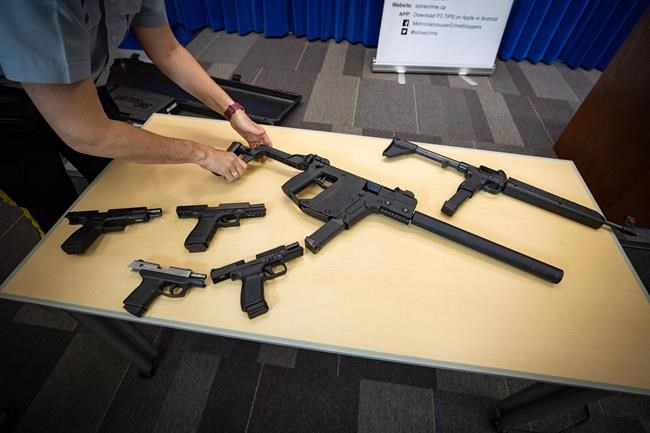Measures in new bill to keep guns from abusers, stalkers welcomed by advocates
Advertisement
Read this article for free:
or
Already have an account? Log in here »
To continue reading, please subscribe:
Monthly Digital Subscription
$0 for the first 4 weeks*
- Enjoy unlimited reading on winnipegfreepress.com
- Read the E-Edition, our digital replica newspaper
- Access News Break, our award-winning app
- Play interactive puzzles
*No charge for 4 weeks then price increases to the regular rate of $19.00 plus GST every four weeks. Offer available to new and qualified returning subscribers only. Cancel any time.
Monthly Digital Subscription
$4.75/week*
- Enjoy unlimited reading on winnipegfreepress.com
- Read the E-Edition, our digital replica newspaper
- Access News Break, our award-winning app
- Play interactive puzzles
*Billed as $19 plus GST every four weeks. Cancel any time.
To continue reading, please subscribe:
Add Free Press access to your Brandon Sun subscription for only an additional
$1 for the first 4 weeks*
*Your next subscription payment will increase by $1.00 and you will be charged $16.99 plus GST for four weeks. After four weeks, your payment will increase to $23.99 plus GST every four weeks.
Read unlimited articles for free today:
or
Already have an account? Log in here »
Hey there, time traveller!
This article was published 31/05/2022 (1290 days ago), so information in it may no longer be current.
OTTAWA – Planned new measures to keep guns out of the hands of abusers and stalkers are being welcomed by advocates who have long called for loopholes in the system to be closed.
The Liberal government bill introduced this week proposes automatic removal of gun licences from people who commit domestic violence or engage in criminal harassment, such as stalking.
The provision could apply to people who have a restraining order or are subject to a peace bond, to be spelled out in regulations.

Revocation of a licence would require the sale, deactivation or surrender of all of the individual’s firearms.
The legislation would also create a “red flag” law allowing courts to require that people considered a danger to themselves or others surrender their firearms to police. It includes a measure to guard the safety of those applying through the process — often women in danger of domestic abuse — by protecting their identities.
The bill also proposes a “yellow flag” provision under which chief firearms officers could temporarily suspend a firearms licence if the officer receives information that raises questions about licence eligibility.
The person could not use guns or acquire new ones while an assessment took place.
The legislation would also require the surrender of firearms during a legal challenge of a licence revocation.
In addition, someone would be refused a gun licence if they are subject to a restraining order or have been in the past, with some exceptions.
Heather McGregor, CEO of YWCA Toronto, said the proposed legislation goes a long way to providing mechanisms to remove guns from people who pose a risk to others.
“This is a without a doubt a gendered issue,” she said after the bill was tabled Monday. “Guns figure prominently in violence against women and increase the likelihood women will be killed.”
Tiffany Butler, executive director of the National Association of Women and the Law applauded the government for tabling a bill that “addresses the heightened risk of gun violence for victims of domestic abuse and others seeking protection orders.”
The bill would also put a national freeze on importing, buying, selling or otherwise transferring handguns, increase maximum penalties for gun smuggling and trafficking, and allow for disclosure of information about gun licence holders to police if there were grounds to believe trafficking was taking place.
Conservative public safety critic Raquel Dancho said Tuesday the federal announcement “fell flat and it’s misleading to tell Canadians that it will have any impact on reducing gun violence in Canada.”
She stressed a need to bolster police guns and gangs units as well as border security.
Two years ago, the government announced a ban on over 1,500 models and variants of what it considers assault-style firearms. The Liberals plan to introduce a mandatory buyback program to offer compensation to affected owners and businesses.
Bans will not be effective “because criminals who cause the gun violence in Canada don’t listen to bans,” Dancho said.
The government has previously said it would work with provinces and territories that want to ban handguns — a step beyond the freeze announced this week. The approach drew criticism last year from some firearm-control advocates as a blueprint for an ineffective patchwork of regulations across Canada.
Public Safety Minister Marco Mendicino indicated Tuesday the door is still open to such an approach, however. “I have remained in close contact with provincial counterparts to look for ways to go even further on that,” he said. “All options remain on the table.”
This report by The Canadian Press was first published May 31, 2022.
— With files from Mia Rabson

